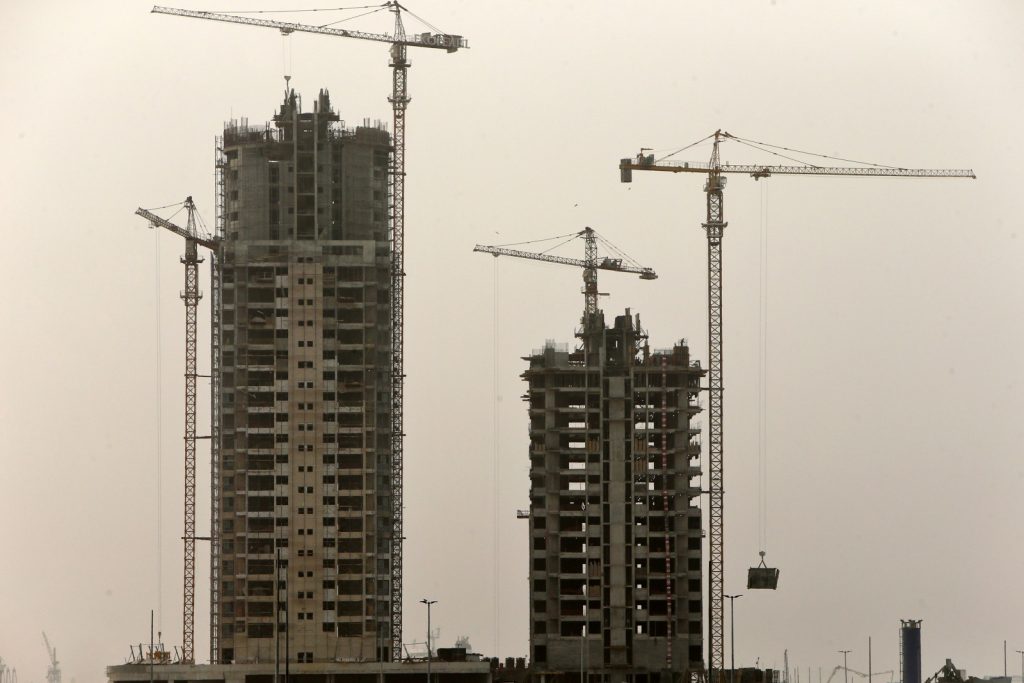Partially lit office buildings on the city skyline during a loadshedding power outage period, in Johannesburg, South Africa. (Leon Sadiki/Bloomberg via Getty Images)
The one and only time I have been to Lagos, Nigeria, was in 2005 as an impressionable young man. I think I described it back then as New York on acid or cocaine of the variant that was consumed in the eighties in the Big Apple. Think peak Michael Douglas in a Lamborghini Countach on a potholed highway.
A buzz of energy, colour circling around decaying, decrepit and incomplete buildings from the end of the 20th century, infrastructure projects from the mainland to Victoria Island. I loved it, the chaos spoke of many stories from its independence in 1960 to the many false promises of all its democratically elected leaders and dictators along the way. It’s a history that I am once again enjoying as I reread Americanah by Chimamanda Ngozi Adichie.
Over the weekend, Nigerians once again headed to the polls to decide whose promises can best be believed. There are about 18 different parties promising to kickstart its economy, which much like South Africa’s, has run aground over the past decade and dragged down the prospects for the sub-Saharan African region as a whole. Everyone trumpets East Africa and other nodes as new centres of growth for the continent but South Africa and Nigeria are the behemoths — their prospects matter most.
 Polling clerks start to count the votes at a polling station after completing the voting process of the general election in Lagos, Nigeria on February 25, 2023. Nigeria will elect the President and Vice President and members of the Senate and House of Representatives. (Photo by Emmanuel Osodi/Anadolu Agency via Getty Images)
Polling clerks start to count the votes at a polling station after completing the voting process of the general election in Lagos, Nigeria on February 25, 2023. Nigeria will elect the President and Vice President and members of the Senate and House of Representatives. (Photo by Emmanuel Osodi/Anadolu Agency via Getty Images)
The countries are at a similar crossroads with their politics. Critically, both need an injection of confidence in their policymakers, who’ve made a brouhaha about their respective economic promises, but have failed to deliver. The private sector alone will not save us, except to provide generators to bellow in the dark. (What a winning bet — generators and solar.)
While catching up on some Nigerian fiction and on the news of the elections in that country — which you can follow in the Mail & Guardian — I thought about the comparisons that I had made between Nigeria and South Africa on my first, and admittedly very impressionable, visit to Lagos. What stood out to me was just how visibly incomplete some of the big infrastructure projects were as I navigated through the hours of traffic because of that very problem. My hosts commented that, for most, money had simply dried up — the state couldn’t see it through.
There are many reasons why funds would dry up. I suppose corruption is front of mind. Politicians and opportunists had syphoned off their piece of whatever contracts had been dished out, affecting working capital. The inability of the state to rein in this corruption over time would eventually erode all confidence and make it impossible, or too expensive, to raise further funding. Sprawled across the city — of more than 15 million today — were projects which served as reminders of what could have been. Unfulfilled potential.
 Cranes operate on the construction of two of the five Eko Pearl Towers residential blocks at the Eko Atlantic city site, developed by Eko Atlantic, near Victoria island in Lagos, Nigeria. (George Osodi/Bloomberg via Getty Images)
Cranes operate on the construction of two of the five Eko Pearl Towers residential blocks at the Eko Atlantic city site, developed by Eko Atlantic, near Victoria island in Lagos, Nigeria. (George Osodi/Bloomberg via Getty Images)
That’s a sad state of affairs, and something that increasingly I feel could be our fate one day. While the treasury and other institutions might try to minimise the impact of greylisting, coming three years after our relegation to “junk status”, this does serve as a dire warning about what might come to pass in South Africa. The more the state, and this is not the ANC, loses credibility in the eyes of both its citizens and markets — which fund its day-to-day operations — the closer we come to funds drying up.
Today we sit with an electricity project that is incomplete. A Gautrain project, but it is incomplete. A Sanral-led highway expansion project that is incomplete. There’s a near trillion rand water infrastructure project that is incomplete or yet to start. The list goes on. While there is still appetite in both domestic and international markets to fund these projects as seen by the contest around renewable energy future, it isn’t by any stretch of the imagination ferocious.
If the state doesn’t start to claw back credibility in both the eyes of its citizens and markets, all the many projects that need to be done will find it near impossible to raise funding to complete them. Across this highly industrialised economy, we’ll see more and more “white elephants” marking unfulfilled promises. It’s where we are heading.
Last week, the outgoing Eskom CEO in Andre De Ruyter hit those alarm bells and in the process alerted an already anxious and watching investment public that their returns on any commitment to our $8.5 billion Just Transition is at risk. Undoing that damage will prove a Herculean Task. But, it’s the truth – we best face it than sweep it under the rug if we are to avoid the missteps of Nigeria with its great promise that sits unfulfilled.